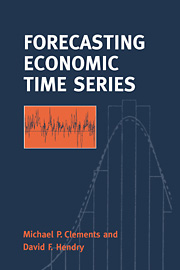Book contents
- Frontmatter
- Contents
- List of figures
- List of tables
- Preface
- Common acronyms
- 1 An introduction to forecasting
- 2 First principles
- 3 Evaluating forecast accuracy
- 4 Forecasting in univariate processes
- 5 Monte Carlo techniques
- 6 Forecasting in cointegrated systems
- 7 Forecasting with large-scale macroeconometric models
- 8 A theory of intercept corrections: beyond mechanistic forecasts
- 9 Forecasting using leading indicators
- 10 Combining forecasts
- 11 Multi-step estimation
- 12 Parsimony
- 13 Testing forecast accuracy
- 14 Postscript
- Glossary
- References
- Author index
- Subject index
12 - Parsimony
Published online by Cambridge University Press: 02 November 2009
- Frontmatter
- Contents
- List of figures
- List of tables
- Preface
- Common acronyms
- 1 An introduction to forecasting
- 2 First principles
- 3 Evaluating forecast accuracy
- 4 Forecasting in univariate processes
- 5 Monte Carlo techniques
- 6 Forecasting in cointegrated systems
- 7 Forecasting with large-scale macroeconometric models
- 8 A theory of intercept corrections: beyond mechanistic forecasts
- 9 Forecasting using leading indicators
- 10 Combining forecasts
- 11 Multi-step estimation
- 12 Parsimony
- 13 Testing forecast accuracy
- 14 Postscript
- Glossary
- References
- Author index
- Subject index
Summary
We have addressed many issues arising in selecting models for forecasting, including selection criteria, the roles of causal information and indicators, the sources of error, forecast combinations, and the role of stationarity transformations. Both asymptotic analyses and small-sample evidence have been presented. However, the topic of parsimony remains to be analysed, and that is the focus of this chapter. Although most forecasters seem to believe that parsimony is important, and profligate parameterizations do not help multi-step forecasting, a formal theory has not yet been developed. After noting the large literature on model-selection criteria, we consider decisions based on values of the t-test of a coefficient on a variable being zero, and relate the outcome to our earlier result on non-monotonic forecast confidence intervals. However, it is hard to generalize this analysis to vector processes, as the powering up of a matrix can have odd effects on the importance of individual coefficients. Next, we establish that collinearity between regressors cannot be a strong justification for parsimony in stationary processes, but may play a role in systems subject to structural breaks. Finally, simplification in model selection is considered to establish whether it exacerbates or attenuates dependence on accidental aspects of a data set.
- Type
- Chapter
- Information
- Forecasting Economic Time Series , pp. 280 - 311Publisher: Cambridge University PressPrint publication year: 1998

